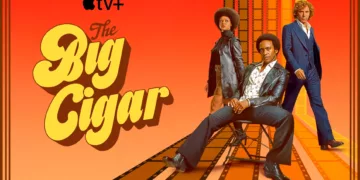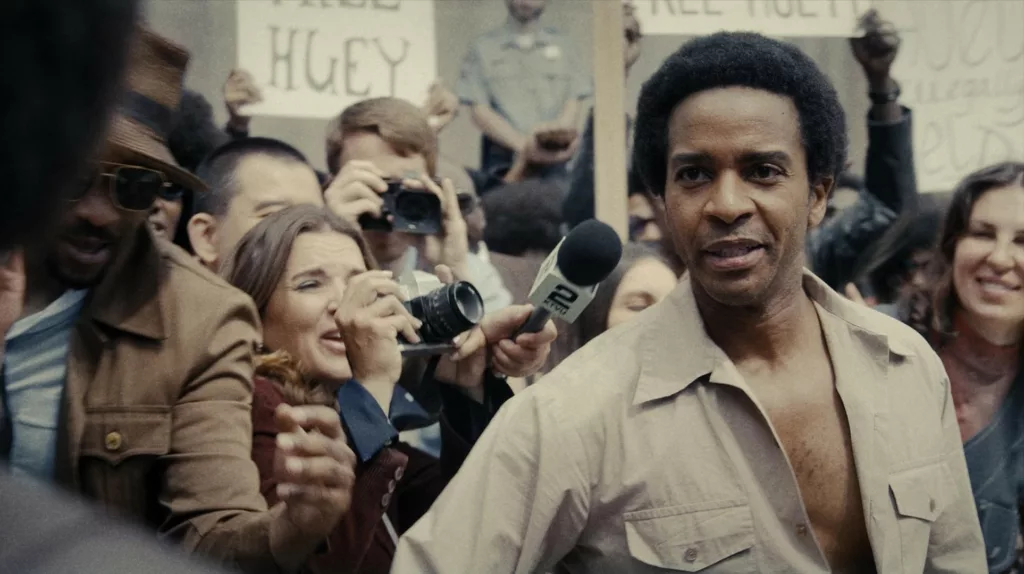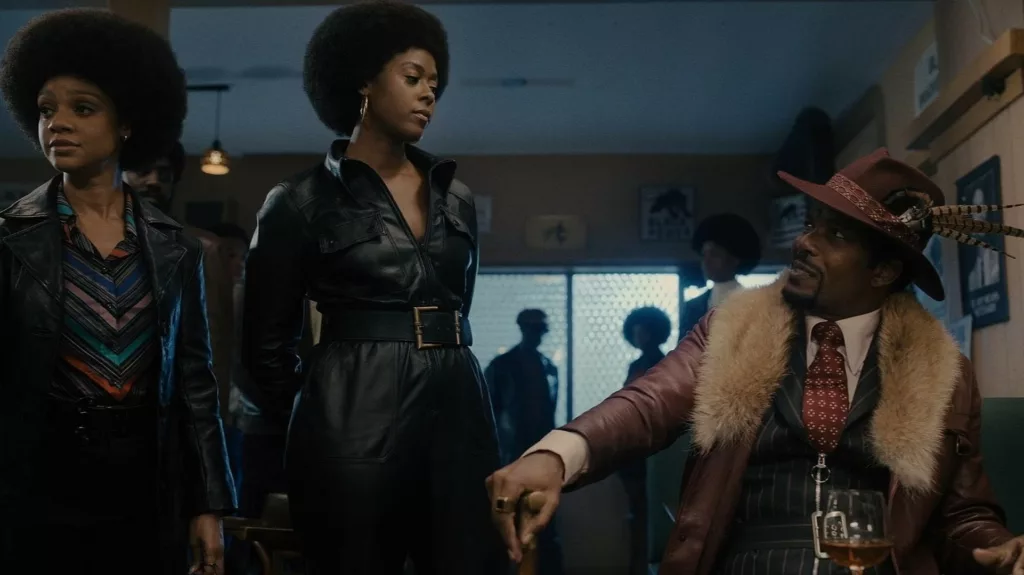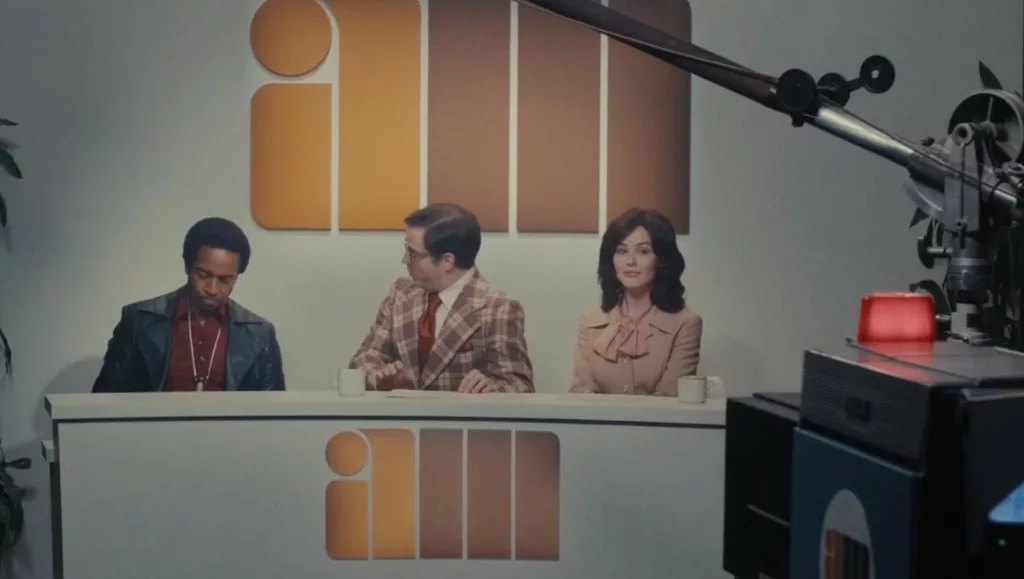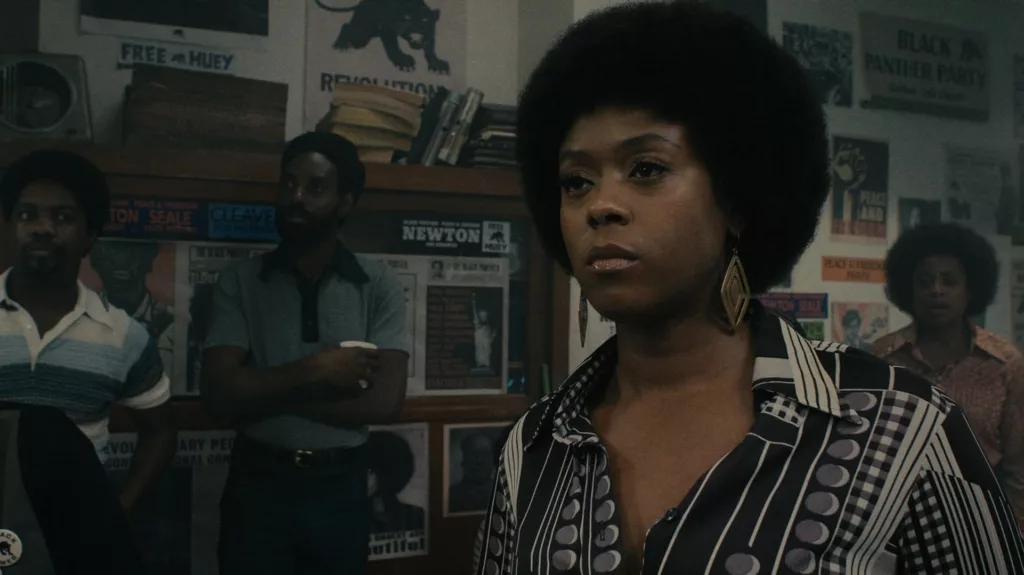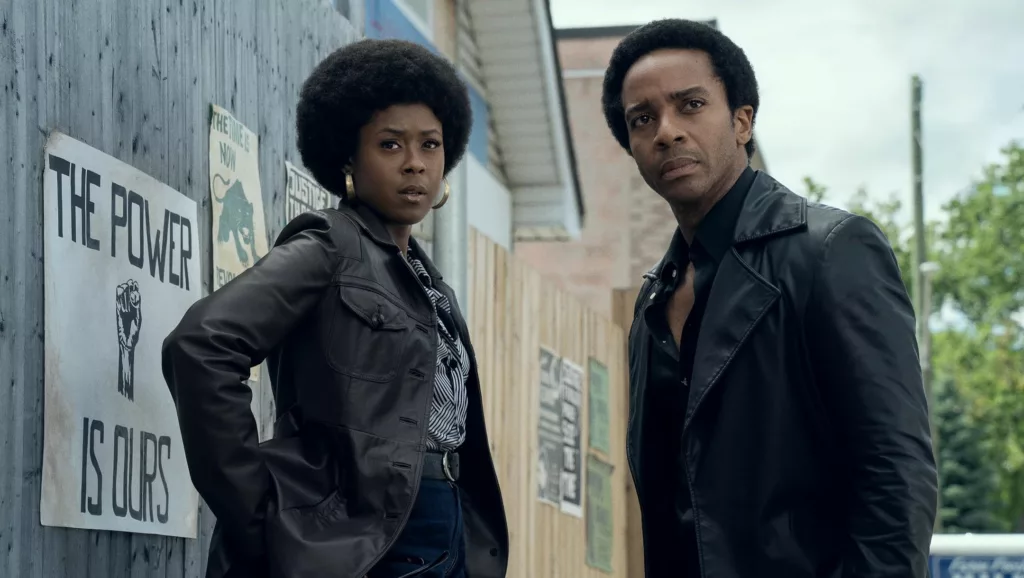Though set nearly five decades ago, The Big Cigar tackles issues still relevant today. The miniseries tells the story of Huey P. Newton, founder of the Black Panther Party, who fled the United States in 1974 while facing murder charges. Seeking escape, Newton turned to an unlikely source: Hollywood producers.
Inspired by a true story reported in Playboy magazine, the show centers around Newton’s unorthodox plan to travel to Cuba under the guise of filming a fake movie. With the FBI on his trail, legendary figures like Bert Schneider and Jack Nicholson get involved to help Newton flee the country. At first glance, pairing a radical black revolutionary with glitzy white Hollywood may seem strange. But the series explores how those from opposing worlds can find common ground and shape history together.
Over six absorbing episodes, the show transports viewers back to 1970s America, where police brutality and systemic racism raged. It vividly captures Newton’s disillusionment with a nation failing its citizens and unwilling to change. Yet it also highlights the human ability to overcome divisions and uncommon alliances that can form in times of crisis. Through its creative reimagining of real events, The Big Cigar offers insight into Newton’s journey and important lessons that continue to resonate today.
Escaping Danger
In 1974, Huey Newton finds himself in a desperate situation. Once a leader of the Black Panther Party, fighting for black liberation, he now stands accused of murder. Facing imprisonment or worse, he flees to the one place he hopes can help: Hollywood. There he meets Bert Schneider, a famous producer behind groundbreaking films. Bert wants to use his connections and clout to support righteous causes. He sees in Huey a chance to do just that.
Bert hatches a plan to secretly transport Huey out of the country to safety in Cuba. To avoid suspicion, they’ll disguise the escape as a movie project. Thus is born the fictional film “The Big Cigar,” providing cover for their endeavor. With the help of his producing partner, Stephen Blauner, and others in their circle, the scheme is set in motion. The chaotic production that follows leads them on a thrill ride, with the FBI in hot pursuit. Through creative cunning and plenty of sheer luck, they just may pull off the unthinkable.
Along the way, the complexity of these men comes to the fore. Huey remains driven by his ideals but shows signs of paranoia from past persecution. Once a charismatic voice of revolution, he now navigates internal conflicts and an uncertain path ahead. Bert wants desperately to leave his mark, though his wealthy privilege often blinds him. Stephen proves the calming influence, yet he too struggles with how far involvement should go.
Over six nail-biting episodes, their tense plan unfolds against the backdrop of 1970s America. Flashes of Huey’s past mingle with their present predicament, portraying the mounting personal toll wrought by racism and reactionaries.
While the story focuses on their attempted escape, it shines a revealing light on how those in power handled dissent and the real-world forces that threatened crusaders for justice. By its end, this high-stakes thriller brings power, purpose, and paradox into sharp focus through the intertwined fates of these unforgettable protagonists.
The Big Cigar Brings the ’70s to Life
Don Cheadle and Janine Sherman Barrois bring a funky flair to the early episodes of The Big Cigar. Under their direction, the ’70s come alive in full color. Neon signs glow amid the California night while cars zoom down palm-tree-lined streets. Jackets and dresses pop with bold patterns that channel the exuberance of the era.
Split screens and jarring cuts keep viewers on their toes, mimicking the frenzied mindstate of Huey P. Newton. As Newton scrambles to escape capture, the edits jump frantically between the past and present. Photos and memories fly by in blurs of dissolving images. We experience history looping in on itself as Newton relives old nightmares.
The hip production design transports us straight to the world of New Hollywood. In exclusive soirees, the rich and famous party like there’s no tomorrow. Sweaty bodies pulse to infectious funk beats in packed nightclubs. Everything shimmers with the carefree vibrance of people believing they can change the world.
Andre Holland brings Newton bursting off the screen, commanding every scene. We feel Newton’s restlessness as he taps tense fingers and shifting eyes to search for danger in every shadow. Yet his innate charisma still draws people to him, even amid the panic. Alessandro Nivola equally shines as the well-meaning but shallow Bert Schneider. Together, their intense performances breathe complex humanity into historical figures.
The Big Cigar replicates the paranoia and possibility of its era with style and soul. Even when the story loses its way, the passion of its makers for the period carries us along for the ride.
Hollywood and the Black Panthers
The Black Panther Party emerged amid tremendous social upheaval. In the late 1960s, the civil rights movement battled ongoing racism and violence, seeking political and economic empowerment for black communities. Groups like the Panthers advocated for self-defense in the face of continued threats. Co-founded in 1966 by Huey Newton and Bobby Seale, the Panthers practiced armed patrols to monitor police behavior. They established free social programs, from education to healthcare.
Newton quickly became a prominent leader and a source of controversy. By 1974, tensions within the party had grown. Internal conflicts arose as the FBI targeted the group through its COINTELPRO program. The assassination of other black leaders like MLK deeply unsettled Newton. Facing new charges, including murder, he fled the country with Hollywood’s aid in the story depicted.
The Big Cigar captures some key facts in this context. We see glimpses of the party’s ideals and community work. Tensions between the Newton and Eldridge Cleaver surfaces COINTELPRO’s surveillance and Malcolm X’s death also factor in. Yet the series can only do so much in its six brief episodes. Simplifying is necessary for any dramatic retelling, but some reductions come at the cost of understanding.
Newton’s psychological state and the movement’s exponential changes receive limited examination. Crucial divisions between the party’s early and later years are glossed over. The display of internal conflicts feels superficial. Broader systemic racial injustices that necessitated groups like the Panthers barely feature. And while the show centers on a true story, its focus on white characters leaves needed perspective on the table.
With such a rich history to mine, The Big Cigar provides at best an abbreviated look at Huey Newton and the Black Power movement’s tremendous influence. While entertaining, its framing only scratches the surface of what shaped this revolutionary figure.
Focusing the Spotlight: Missed Chances for Meaning in The Big Cigar
At its heart, The Big Cigar is about searching for freedom and truth amid systems designed to obscure both. Huey P. Newton dedicates his life to liberating his people from oppression, yet he still finds himself a prisoner—of the law, of addiction, of the shifting tides of history.
The series hints at powerful themes surrounding the black radical movement and its complicated legacy. We see glimpses of Newton wrestling with how his image was projected and perceived. He brought fierce pride to his roots yet was uneasy with being lifted to myth. A deeper look at such internal conflicts could have resonated strongly.
Instead, the show keeps circling back to the white characters leading Newton’s escape. Their story presents its own intrigue as marginalized figures working within the system. But making them the focal point risks losing what gave Newton’s journey weight—the tremendous sacrifices, both glorious and grievous, undertaken by black revolutionary heroes.
Streaming the tale through Hollywood’s lens also blunts its social message. Politicians and police pursuing Newton aren’t so much battling social change as inconveniencing the producers’ scheme. A sharper edge highlighting the very real stakes could have turned exposition into provocation.
At its best, The Big Cigar teases the difficulties of continuing the fight when revolutionary fervor fades and the machinery of opposition adapts its aims. But despite André Holland’s committed lead, it backs away from fully exploring such complex issues as radicalism, politics, and how history gets made. The themes are there, glowing dimly beneath the surface, leaving one hoping future projects will bring them boldly into the light.
Hollywood Inspiration Meets True History
The series “The Big Cigar” finds inspiration in real events but takes some imaginative liberties too. The basic premise aligns with fact: Huey P. Newton, facing charges in America, did escape to Cuba in 1974 with the help of Hollywood figures who staged a fake film production. Newton really did know producer Bert Schneider from the counterculture scene.
But the show condenses the details. Newton’s relationships in real life were more complex than portrayed. And the FBI pursuit wasn’t as hapless as bumbling G-men might suggest—law enforcement sabotage of black revolutionaries was devastatingly effective and hard to untangle fact from fiction. Some scenes depict true people like Richard Pryor but place them in fictionalized interactions inconsistent with the historical record.
Where the show falls short is developing Newton beyond this singular episode, glossing over his fuller significance as a leader. Scenes alluding to the party’s breakfast programs and infighting offer tantalizing hints but aren’t substantially explored.
While dramatic license shapes any historical fiction, strengthening context around the real human at the center could have empowered Newton’s story rather than prioritizing suspenseful escapades. Both entertainment and education were possible by honoring complexity over simplification. Even so, the series offers an entertaining glimpse of an obscure historical twist, if not a comprehensive portrait of its protagonist’s meaningful legacy.
Contradictions and Compromise
The Big Cigar took on an immensely complex story in chronicling Huey Newton’s life and struggle. In many ways, it succeeded in bringing nuance and conflicting sides to the fore. André Holland breathed vibrant life into Newton, ensuring viewers understood his passions, fears, and frequent frustrations with how radicalism was perceived.
Yet the series also struggled at times with its own contradictions. By focusing heavily on white figures like Bert Schneider, some of Newton’s inner transformation got lost. And attempting to balance an entertaining thriller with a thoughtful history lesson led to a disjointed tone.
While clearly well-meaning, certain choices felt like compromises too far. Glosses over violence in Newton’s past missed chances for real self-reflection. And dancing around factual inaccuracies weakened an otherwise compelling reimagining.
Still, simply telling this story was a brave act deserving of praise. And in its best moments, brief as they were, we saw reflections of Newton’s full humanity: his love for his people, the toll of facing relentless surveillance, and his unwillingness to stop fighting even when hope seemed lost.
The Big Cigar showed what representation can achieve and what it has yet to fully accomplish. But perhaps its true legacy lies in how it can inspire others to give undertold histories their fullest, most empowering form. If contradictions are addressed with courage, not concession, then the dreams of leaders like Newton may yet find their deserved spotlight.
The Review
The Big Cigar
The Big Cigar shows flashes of brilliance but struggles under the weight of its own contradictions. While telling an important story, it falls short of giving Newton's journey the nuanced treatment it deserves. The Big Cigar takes on a challenging subject but ultimately fails to synthesize complexity with clarity. Storytelling compromises the real potential of its protagonist and historical backdrop.
PROS
- André Holland delivers a complex, passionate portrayal of Huey Newton.
- High production values bring the 1970s era to life.
- Intriguing premise highlighting little-known cooperation between black radicals and Hollywood
CONS
- The narrative jumps around confusingly without fully developing characters.
- Over-reliance on white male perspectives dilutes the focus on Newton.
- Glosses over more controversial aspects of Newton's life and legacy
